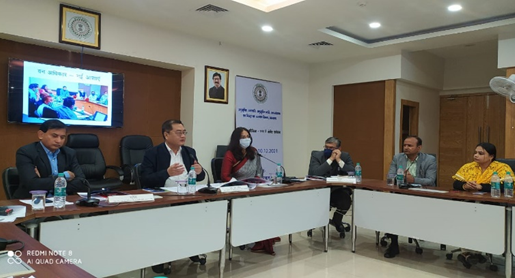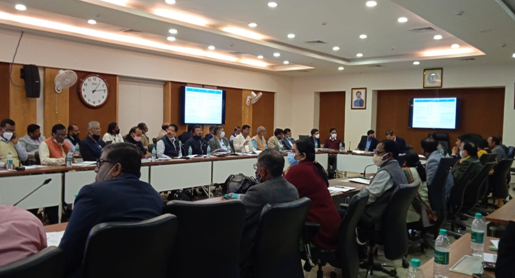- To ensure secure land rights and enhance local livelihoods of the forest dwellers by accessing Forest Right Act (FRA, 2006) in using technology-based solutions.
- To facilitate a collective led process in 1500 villages of Jharkhand to make available eligible CFR (CFR & CFRR) and IFR title to the forest dwellers.
- To carry out the land mapping and demarcation of CFRR&IFR lands by using technological solutions in partnership with CADASTA Foundation
- sustainable Community Forest Resource Management Plan (CFRMP)
- To nurture partnership with Govt, other donors and collaborative work with NGO partners to support this work
- We need to work strategically on forest rights in the State of Jharkhand. Coming to Jharkhand on forest rights, the recognition of Individual, Community and Community Forest Resource Rights claims is less than 5 % of the total forest land. There is a need to raise awareness among the community about the Forest Rights Act. The process of obtaining the claim is also not authentic, due to which the Gram Sabha and Forest Rights Committee are facing a lot of problems in preparing the documents. Discrepancies are also being observed in demarcation of forest land area for claim. There is a need to regularize the Sub-Divisional Level Committee and the District Level Committee. The Government has made the priority to give the title of Individual Forest Rights, Community Forest Rights and Community Forest Resources Rights, but it will come down to the ground only if proper planning and outline are prepared by the Department. The assured participation of women's groups and Gram Sabha and the claim prepared by the Gram Sabha need to be considered in time. The claim on a large scale is either pending or has been cancelled. Proper MIS data of claim and title and regular review of the same is required. Where the claim has been received, there is a need to properly plan for promotion, conservation, management and livelihood of the forest area. Government and NGOs need to work together to bring the benefits of forest rights to the genuine people. There is a need for greater training at all levels, State, District, Block and Village.
- Jharkhand has the extend of potential forest land under FRA (52,36,400 acre) among which only recognized 4.91% (2,57,154 acre)
- Lack of awareness about FRA - forest dwellers and
- Gram Sabha is facing difficulties in documentation
- No standard claim making process & claim documents
- Demarcation issues of recognized titles
- Concern around pending & rejected claims
- Absence of proper MIS and strategic dashboard
- Varying focus on post claim initiatives for Community Forest Resource Management, convergence and Livelihood linkage
- Need for more regular meeting of SDLC and DLC
- Request for knowledge building from supply side is unmet
- Intent and priority of the state need to be converted into designing programs and plans
- Preparedness of SDLC to respond to the claims from Gram Sabhas in a timely manner
- Need for collaboration of CSOs and administration to facilitate grassroots processes
- Lack of Standard Operating Procedure
- Lack of involvement of SHG and Gram Sabha on CFR Conservation and Management
- In Jharkhand we are implementing FRA in 24 blocks of 7 district under ONI project. Out of 24 blocks in 20 blocks PRADAN has direct presence and in 4 blocks we doing this activity through the partnership of two CSOs, JharkahndJangalBachaoAndolan (JJBA) and Gram Jyoti. Both organizations have a long years’ experiences on FRA. More than 20-hectare forest land in the village, social mobilization, existing livelihood interventions, community ownership are the parameters for selection of the project area. The block details are as below -
| Districts: 7 | Block: 24 |
|---|---|
| Gumla | Raidih, Gumla, Ghaghra, Palkot, Basia, Kamdara |
| Lohardaga | Kisko, Kuru, Senha |
| Godda | Sundarpahari, Boarijor |
| Pakur | Litipara |
| West Singhbhum | Bandgaon, Sonua, Chakradharpur, Tonto |
| Seraikela-Kharsawan | Kuchai, Seraikela, Kharsawan |
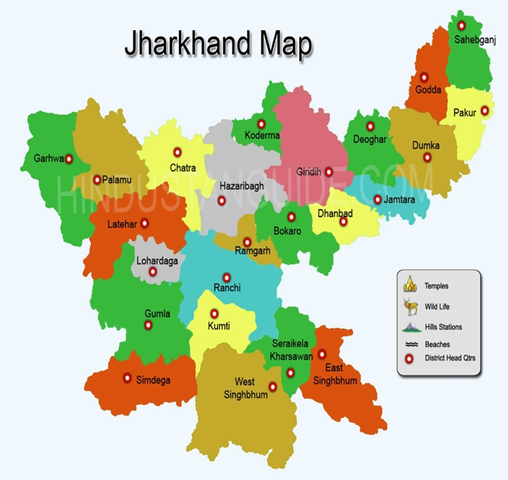
- Total 70 staffs have been engaged for smooth implementation of this project. More than 100 capacity building events have been conducted for proper grooming of project staffs. Online and physical trainings on process and technology part, village stay and village study, workshopand exposure are the various methodology for capacity building. Details of project staffs are as below -
| Sl. No. | Head | Female | Male | Total |
|---|---|---|---|---|
| 1 | State Coordinator | 0 | 1 | 1 |
| 2 | Area coordinators | 0 | 11 | 11 |
| 3 | Jami Sathi | 9 | 37 | 46 |
| 4 | Technical expert | 0 | 1 | 1 |
| 5 | Land anchors | 1 | 10 | 11 |
| Total staff | 10 | 60 | 70 | |
Our major investment has been undertaken for the capacity building of community, PRI representatives, CBO leaders, CSO partners and Government officials on FRA. We have conducted many online as well as offline training events and workshop around this. We got very high participation from community especially women in such events. Following are the detail of trainings and workshop that we have conducted -
| SL NO | Training /workshop Name | No of event | Male | Female | Total participants |
|---|---|---|---|---|---|
| 1 | Concept meeting on FRA | 965 | 14322 | 14658 | 28980 |
| 2 | FRC constitution/ reconstitution training | 240 | 4015 | 3215 | 7230 |
| 3 | FRA workshop with Block officials | 64 | 710 | 314 | 1024 |
| 4 | FRA workshop with PRI representatives | 68 | 1022 | 718 | 1740 |
| 5 | FRA workshop with Federation | 26 | 112 | 512 | 624 |
| 6 | Capacity building of FRA staffs | 104 | 1456 | 624 | 2080 |
| 7 | Technology based training to FRA staffs | 34 | 368 | 142 | 510 |
| 8 | Workshop with CSOs partners and Government officials | 9 | 136 | 49 | 185 |
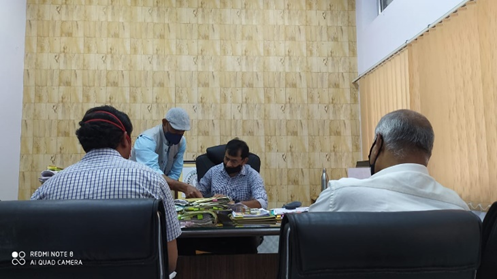
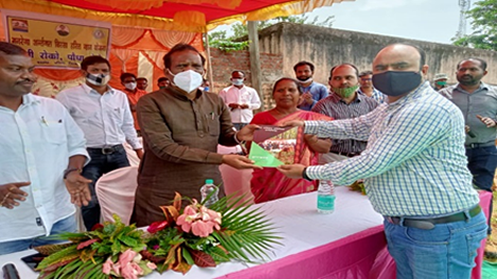
There is a project deliverable to arrange matching grant for FRA. In Jharkhand we have mobilized Development Support Cost and program cost from APPI in implementation of FRA. Our total mobilization for 6 months of period is around 23 lakhs. These costs are basically for project staffs and training purposes. Through this matching grant we can able to help community in claim making and livelihood enhancement.
Progress so farIn this initial 6 moths our major focus isto create large scale awareness to the community around FRA. We have conducted series of events at tola, village and GP level for creating awareness. We have also conducted workshops at block and district level where we invited various stakeholders like federation representatives, block and district officials, political leaders etc. Villagers are very excited in this FRA interventions. We observed high participation of women for each and every meeting either it is concept meeting or FRC formation event. Progress till 30th September is as follow -
| Sl. | No. Indicators | Plan as on 30th Sept 21 | Cumulative achievement as on 30th Sept 21 |
|---|---|---|---|
| 1 | No of village concept seeding done | 700 | 650 |
| 2 | FRC Const / reconstituted | 350 | 240 |
| 3 | Claim document preparation | 1325 | 894 |
| 4 | Joint FRC meeting | 75 | 36 |
| 5 | Joint verification done | 75 | 27 |
| 6 | No of IFR claims filled at GS level | 1250 | 825 |
| 7 | No of IFR claims recommended by GS to SDLC | 1250 | 152 |
| 8 | No of IFR claims recommended by SDLC to DLC | 0 | 48 |
| 9 | No of IFR claims approved at DLC | 0 | 48 |
| 10 | No of IFR title distributed | 0 | 48 |
| 11 | IFR Area Recognized (Ha) | 0 | 22.05 |
| 12 | No of CFR claims filled at GS level | 75 | 69 |
| 13 | No of CFR claims recommended by GS to SDLC | 75 | 22 |
| 14 | No of CFR claims recommended by SDLC to DLC | 0 | 14 |
| 15 | No of CFR claims approved at DLC | 0 | 14 |
| 16 | No of CFR title distributed | 0 | 14 |
| 17 | CFR Area Recognized (Ha) | 0 | 565.65 |
| 18 | No of villages CFRMP done and action initiated | 0 | 2 |
Introduction of GIS Technology in FRA
We have 46 Jamin Sathi and 11 Area Coordinators to reach the 1247 potential FRA villages for the integration of technology. The on-field implementation of technology required to combine crucial information. The components of GIS technology are-
- ESRI CADASTA Platform and Mobile Application for data collection, map preparation and data analysis.
- Trimble devise for GPS accuracy of the device
- Digitized revenue map (SHAPEFILE)
- Records of Right (RoR)
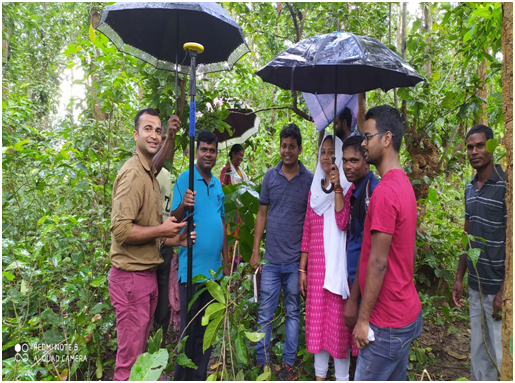
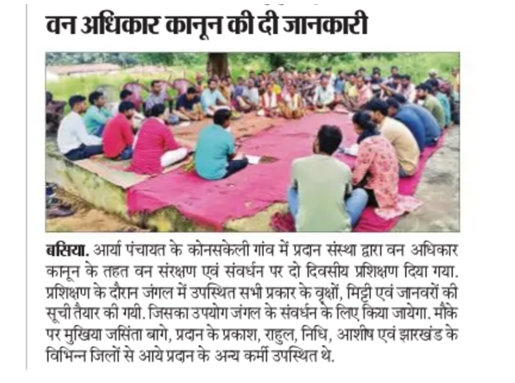
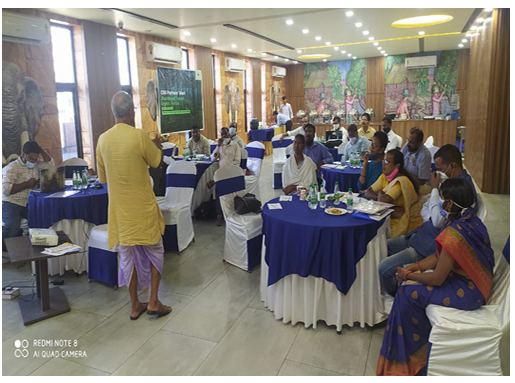
A State Level Workshop was organized on 10th December 2021 in the Auditorium of Project Bhawan, Ranchi with the objective of smooth implementation of Forest Rights Act, 2006 in the State of Jharkhand. Welfare secretary - Kamal Kishore Soan, Revenue & Forest Secretary - L Khiangte, Panchayat & MGNREGA Secretary - Rajshree B and more than 30 Government officials participated in the meeting and we are more than 25 Civil Society Organizations. In this workshop the
